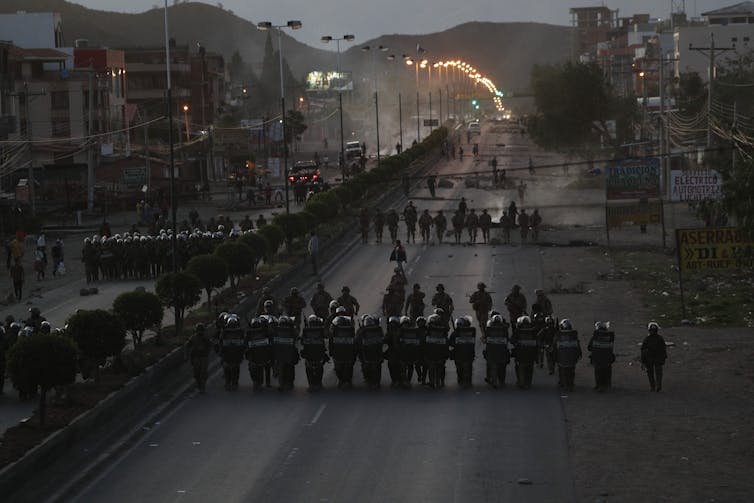Bolivian Apartheid
"[Traditional race relations in Bolivia is similar to] the apartheid system in South Africa, with Indigenous people being second-class citizens."
"The significance of Evo [Morales] was he rose up and achieved a lot of positive things for Indigenous people."
"He rallied his Indigenous base through the rhetoric of racial distinctions, which has now polarized much of the country."
Diego von Vacano, Bolivian political scientist, Texas A&M University
"Racism exists in Bolivia: it existed before Evo, and it will never disappear."
"While Evo started an important discussion, he also manipulated the race issue, and that has caused disunity. And now people of different races look at each other with suspicion."
Michelle Kieffer, insurance broker, La Paz, Bolivia
"They have burned our flag. They have laughed at our culture."
"This is racism; this is discrimination. We will give our lives for our rights."
Alfonso Coque, cocoa grower, Bolivia

Police fired tear gas and live rounds of ammunition on November 15 at Indigenous supporters of former Bolivian President Evo Morales. The protesters attempted to march into Cochambamba, about 400 kilometres east of La Paz. Nine people were killed, dozens others were injured. In Mr. Morales's time in office Indigenous representatives grew in number as he redistributed the country's natural gas wealth, sharing it with native communities.
His time in office led to a renaissance of traditional Bolivian cuisine, music and cultural dress. A multicoloured flag representing the country's diverse Indigenous groups was introduced to give pride to those who had been too long neglected and marginalized. This became an official flag to fly alongside the traditional Independence-era banner of red, green and yellow. All of this and much, much more saw him idolized in many of Bolivia's Indigenous communities.
On the other hand, the major Quechua and Aymara Indigenous tribes comprising roughly a third of the country's adult population were given primary status, leaving many other Bolivians of mixed or European descent, along with smaller Indigenous groups resentful, accusing Mr. Morales of ethnic favoritism. Oddly enough there was a drop in the numbers of Bolivians identifying as members of Indigenous groups, falling to 41 percent in the last census, from 62 percent a decade earlier.
In former President Morales' absence an acting president of European descent has installed herself, even as police have removed insignia representing Indigenous symbols from their uniforms. The Indigenous flag has been burned by protesters, while the acting president appointed an initial cabinet lacking any Indigenous members. "We feel threatened. They don't represent us, they reject us, the Indigenous", stated Juan Acume, a farmer of the Quechua Indigenous group.
Jeanine Afiez Chavez, an opposition senator, proclaimed herself interim president, promising to unite the nation, and that new elections would take place in January. Divisive action began almost immediately when of eleven ministers not one was identified as a member of an Indigenous group until sensing the antagonism directed toward her moves, she relented, appointing an Indigenous minister of culture. The new president revived Catholic rituals in public events despite the Constitution defining Bolivia as a secular state.
 |
Labels: apartheid, Bolivia, Conflict, Evo Morales, Indigenous, Protests, Racial Tensions, Spanish Descendants

<< Home